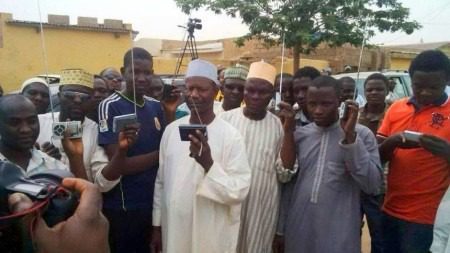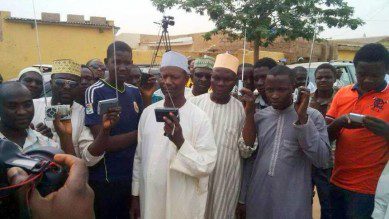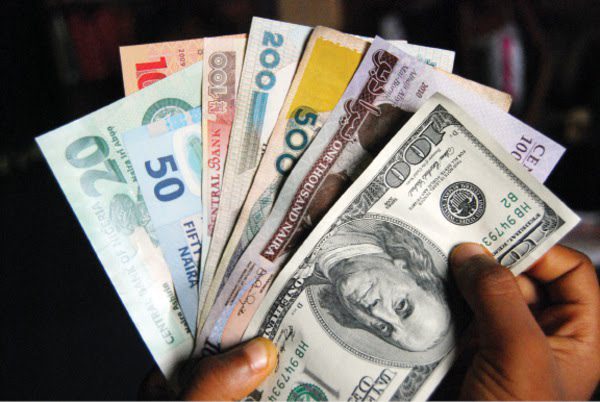National Issues
The menace called ‘Radio Biafra’ -Editorial by Premium Times

The disturbing signals from a radio station in southeast Nigeria called Radio Biafra evoke memories of the tragedy that took place in Rwanda twenty one years ago.
In 1994, a radio station, Radio Télévision Libre des Mille Collines (RTLMC) orchestrated a genocide that stunned the world. Established in 1993, RTLMC appealed to the murderous sentiments of many young people who formed the core of the Interahamwe militia responsible for the death of over 500,000 Rwandans during the genocide that lasted from April to July, 1994.
RTLMC was reported to “have preyed upon the deep animosities and prejudices of many Hutus,” Rwanda’s major group. Those who did not support its hateful ideology were referred to as “cockroaches” and ordered to be killed.
In 2003, the International Criminal Tribunal for Rwanda in Arusha, Tanzania, found RTLMC’s leaders, Ferdinand Nahimana and Jean Bosco Barayagwiza guilty of “genocide, incitement to genocide and crimes against humanity”. Nahimana was sentenced to life imprisonment while Barayagwiza got 35 years in prison. The sentences were appealed and in 2007 reduced to 30 years in prison for Nahimana and 32 years for Barayagwiza.
The lesson of the Rwanda tragedy is one that many modern states can only ignore at their own risk. The activities of RTLMC showed how easily the media can be used as a medium for the propagation of violence and hate speech and how quickly such activities can spiral out of control if not checked.
Fast forward to Nigeria, 2015. Radio Biafra is not particularly new. For many years, it operated as an online pirate station by some faceless individuals. All that has now changed as the station, operated by one Nnamdi Kanu who goes by the pompously aspirational title “director” has recently started operating on a frequency Modulation (FM) band 102.1, and apparently now received in most south-south and south-east states, according to claims by many receivers.
This radio has not only changed its mode of operations, it seems to have raised the bar in terms of its bloodcurdling rhetoric. The proprietors of Radio Biafra claim it is “dedicated to the defense of (the) rights of the indigenous people of Biafra and ultimately the actualization of the Republic of Biafra.” And the way they have gone about actualizing their aims leaves much to be desired.
In a nation defined by the complex ethno-national and cultural diversity of Nigeria’s pluralism, identity politics and the creation of iconographies in pursuit of their goals are understandable and even welcome. Indeed the claim that diversity is strength derives its substance from this assumption.
Yet to transform the inert potentialities of pluralism to political and cultural actualities also assume the evident capacity to manage diversity to strength. Sadly the Nigerian political elites have been abysmally inept in this regard.
A few years ago, it was Mohammed Yusuf, the purported spiritual leader of the murderous terrorist group, Boko Haram. What started off as an innocuous group under the name “Jama’atu Ahlis Sunna Lidda’awati wal-Jihad” – in Arabic, “People Committed to the Propagation of the Prophet’s Teachings and Jihad” – has metamorphosed into perhaps Nigeria’s greatest existential challenge and a major social, political and military problem for the West African sub-region.
Now is the time to nip in the bud the activities of Radio Biafra and self-theatricalising promoter, Mr. Kanu who deludes himself as a “liberator” and “God Sent”. From the bitter experiences of the tragic theatre in Boko Haram, we can’t allow this current menace that defines promotion of identity in the annulment of the other to fester.
To actualize his aim, Mr. Kanu, ensconced in the comfort of Europe, where a relative culture of tolerance guarantees his liberties and freedom, has reportedly asked his listeners to annul those same values at home, and destroy certain individuals and groups not supportive of his murderous ideology.
He regularly calls on listeners to not only contribute to his cause materially and financially but to arm themselves and ominously wait for further directives.
The response of the federal government through the regulatory agency the National Broadcasting Commission (NBC) to the Radio Biafra menace has been tepid if not downright silly. True, broadcast regulators face fresh and tough challenges in the new digital media ecosystem, but the agency would be living better to mandate if it helps to heighten and define this threat in its complexities rather than simply asking Nigerians to ignore the radio.
For a nation with the bitter history of a fratricidal carnage on the tragic scale of the civil war, the challenges of continued unity and development are not helped by such distractions like Radio Biafra.
Yet it will not be enough to simply ignore Radio Biafra. Just like Boko Haram, Radio Biafra once again challenges the foundations of justice and equity in the architecture of the Nigerian nation. Beyond wielding the stick and simply treating this as a national security issue, it is also important for the government to interrogate the reasons that throws up centrifugal forces that tend to undermine the unity of the country but make national cohesion and progress impossible.

















